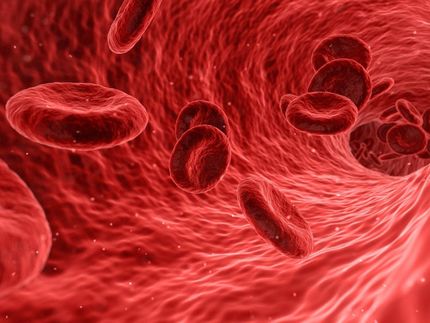Turning the enemy into a friend
Sounds paradoxical: varicella zoster virus spreads better in the body by enhancing an immune defence mechanism
Advertisement
varicella zoster virus (VZV) can cause chickenpox, as well as shingles and severe complications. When one comes into contact with VZV for the first time, the virus enters the body through the airways, reaching the mucous membranes in the nasopharynx and adjacent lymphatic tissues, from where VZV infects T lymphocytes. In these immune cells, VZV spreads throughout the body, reaching skin cells - resulting in chickenpox - and neurons, where it remains latent. If VZV becomes active again later in life, it causes shingles.

Dr. Carina Jacobsen (first author) and Nina Plückebaum (second author) with the device used to measure the interaction between the viral protein (glycoprotein C) and interferon.
Copyright:Lucas Mendes-Monteiro
To defend against VZV, the body produces interferons, among other things. However, this defence only works to a limited extent. Researchers led by Prof. Abel Viejo-Borbolla at the Institute of Virology of Hannover Medical School (MHH) have now studied how the virus manages to escape this defence mechanism. The result sounds paradoxical: the virus does not weaken the immune response, but rather specifically enhances it for its own advantage. The research team published their findings in the prestigious journal Nature Communications.
"The glycoprotein C of VZV binds in particular to interferon gamma. This leads to modulation of the signals triggered by this cytokine, resulting in increased production of certain proteins, for example the intercellular adhesion molecule 1," explains Dr. Carina Jacobsen, first author of the article. This molecule promotes cell adhesion and thus T cells bind more easily to the infected skin cells and more virions can be transferred from the skin cells to the immune cells. In a sense, the virus has then managed to mount the Trojan horse - in order to spread throughout the body.
The research results form the basis for the development of new drugs against these and possibly other viruses.
Original publication
Carina Jacobsen, Nina Plückebaum, George Ssebyatika, Sarah Beyer, Lucas Mendes-Monteiro, Jiayi Wang, Kai A. Kropp, Víctor González-Motos, Lars Steinbrück, Birgit Ritter, Claudio Rodríguez-González, Heike Böning, Eirini Nikolouli, Paul R. Kinchington, Nico Lachmann, Daniel P. Depledge, Thomas Krey, Abel Viejo-Borbolla; "Viral modulation of type II interferon increases T cell adhesion and virus spread"; Nature Communications, Volume 15, 2024-6-22
























































